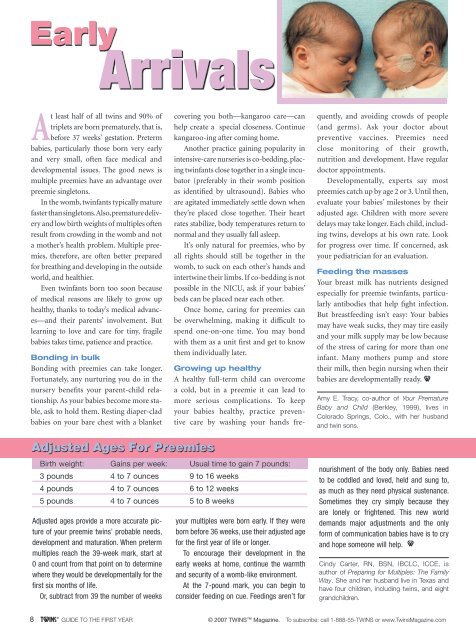2007GuideToTheFirstYear
Create successful ePaper yourself
Turn your PDF publications into a flip-book with our unique Google optimized e-Paper software.
Early<br />
Arrivals<br />
At least half of all twins and 90% of<br />
triplets are born prematurely, that is,<br />
before 37 weeks’ gestation. Preterm<br />
babies, particularly those born very early<br />
and very small, often face medical and<br />
developmental issues. The good news is<br />
multiple preemies have an advantage over<br />
preemie singletons.<br />
In the womb, twinfants typically mature<br />
faster than singletons. Also, premature delivery<br />
and low birth weights of multiples often<br />
result from crowding in the womb and not<br />
a mother’s health problem. Multiple preemies,<br />
therefore, are often better prepared<br />
for breathing and developing in the outside<br />
world, and healthier.<br />
Even twinfants born too soon because<br />
of medical reasons are likely to grow up<br />
healthy, thanks to today’s medical advances—and<br />
their parents’ involvement. But<br />
learning to love and care for tiny, fragile<br />
babies takes time, patience and practice.<br />
Bonding in bulk<br />
Bonding with preemies can take longer.<br />
Fortunately, any nurturing you do in the<br />
nursery benefits your parent-child relationship.<br />
As your babies become more stable,<br />
ask to hold them. Resting diaper-clad<br />
babies on your bare chest with a blanket<br />
covering you both—kangaroo care—can<br />
help create a special closeness. Continue<br />
kangaroo-ing after coming home.<br />
Another practice gaining popularity in<br />
intensive-care nurseries is co-bedding, placing<br />
twinfants close together in a single incubator<br />
(preferably in their womb position<br />
as identified by ultrasound). Babies who<br />
are agitated immediately settle down when<br />
they’re placed close together. Their heart<br />
rates stabilize, body temperatures return to<br />
normal and they usually fall asleep.<br />
It’s only natural for preemies, who by<br />
all rights should still be together in the<br />
womb, to suck on each other’s hands and<br />
intertwine their limbs. If co-bedding is not<br />
possible in the NICU, ask if your babies’<br />
beds can be placed near each other.<br />
Once home, caring for preemies can<br />
be overwhelming, making it difficult to<br />
spend one-on-one time. You may bond<br />
with them as a unit first and get to know<br />
them individually later.<br />
Growing up healthy<br />
A healthy full-term child can overcome<br />
a cold, but in a preemie it can lead to<br />
more serious complications. To keep<br />
your babies healthy, practice preventive<br />
care by washing your hands frequently,<br />
and avoiding crowds of people<br />
(and germs). Ask your doctor about<br />
preventive vaccines. Preemies need<br />
close monitoring of their growth,<br />
nutrition and development. Have regular<br />
doctor appointments.<br />
Developmentally, experts say most<br />
preemies catch up by age 2 or 3. Until then,<br />
evaluate your babies’ milestones by their<br />
adjusted age. Children with more severe<br />
delays may take longer. Each child, including<br />
twins, develops at his own rate. Look<br />
for progress over time. If concerned, ask<br />
your pediatrician for an evaluation.<br />
Feeding the masses<br />
Your breast milk has nutrients designed<br />
especially for preemie twinfants, particularly<br />
antibodies that help fight infection.<br />
But breastfeeding isn’t easy: Your babies<br />
may have weak sucks, they may tire easily<br />
and your milk supply may be low because<br />
of the stress of caring for more than one<br />
infant. Many mothers pump and store<br />
their milk, then begin nursing when their<br />
babies are developmentally ready.<br />
Amy E. Tracy, co-author of Your Premature<br />
Baby and Child (Berkley, 1999), lives in<br />
Colorado Springs, Colo., with her husband<br />
and twin sons.<br />
Adjusted Ages For Preemies<br />
Birth weight:<br />
3 pounds<br />
4 pounds<br />
5 pounds<br />
Gains per week:<br />
4 to 7 ounces<br />
4 to 7 ounces<br />
4 to 7 ounces<br />
Adjusted ages provide a more accurate picture<br />
of your preemie twins’ probable needs,<br />
development and maturation. When preterm<br />
multiples reach the 39-week mark, start at<br />
0 and count from that point on to determine<br />
where they would be developmentally for the<br />
first six months of life.<br />
Or, subtract from 39 the number of weeks<br />
Usual time to gain 7 pounds:<br />
9 to 16 weeks<br />
6 to 12 weeks<br />
5 to 8 weeks<br />
your multiples were born early. If they were<br />
born before 36 weeks, use their adjusted age<br />
for the first year of life or longer.<br />
To encourage their development in the<br />
early weeks at home, continue the warmth<br />
and security of a womb-like environment.<br />
At the 7-pound mark, you can begin to<br />
consider feeding on cue. Feedings aren’t for<br />
nourishment of the body only. Babies need<br />
to be coddled and loved, held and sung to,<br />
as much as they need physical sustenance.<br />
Sometimes they cry simply because they<br />
are lonely or frightened. This new world<br />
demands major adjustments and the only<br />
form of communication babies have is to cry<br />
and hope someone will help.<br />
Cindy Carter, RN, BSN, IBCLC, ICCE, is<br />
author of Preparing for Multiples: The Family<br />
Way. She and her husband live in Texas and<br />
have four children, including twins, and eight<br />
grandchildren.<br />
8 GUIDE TO THE FIRST YEAR © 2007 TWINS Magazine. To subscribe: call 1-888-55-TWINS or www.TwinsMagazine.com


















